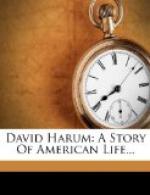“Worn the clothes without the slightest hesitation,” replied John. “Nobody gave your costume a thought.”
“They didn’t appear to, fer a fact,” said David, “an’ I didn’t either, after I’d slipped up once or twice on the matter of pockets. The same feller brought ’em up to me that fetched the stuff in the mornin’; an’ the rig was complete—coat, vest, pants, shirt, white necktie, an’, by gum! shoes an’ silk socks, an’, sir, scat my ——! the hull outfit fitted me as if it was made fer me. ‘Shell I wait on you, sir?’ says the man. ‘No,’ I says, ’I guess I c’n git into the things; but mebbe you might come up in ‘bout quarter of an hour an’ put on the finishin’ touches, an’ here,’ I says, ’I guess that brand of eggs you give me this mornin’ ‘s wuth about two dollars apiece.’
“‘Thank you, sir,’ he says, grinnin’, ’I’d like to furnish ’em right along at that rate, sir, an’ I’ll be up as you say, sir.’”
“You found the way to his heart,” said John, smiling.
“My experience is,” said David dryly, “that most men’s hearts is located ruther closter to their britchis pockets than they are to their breast pockets.”
“I’m afraid that’s so,” said John.
“But this feller,” Mr. Harum continued, “was a putty decent kind of a chap. He come up after I’d got into my togs an’ pulled me here, an’ pulled me there, an’ fixed my necktie, an’ hitched me in gen’ral so’st I wa’n’t neither too tight nor too free, an’ when he got through, ’You’ll do now, sir,’ he says.
“‘Think I will?’ says I.
“‘Couldn’t nobody look more fit, sir,’ he says, an’ I’m dum’d,” said David, with an assertive nod, “when I looked at myself in the lookin’-glass. I scurcely knowed myself, an’ (with a confidential lowering of the voice) when I got back to New York the very fust hard work I done was to go an’ buy the hull rig-out—an’,” he added with a grin, “strange as it may appear, it ain’t wore out yit.”
CHAPTER XXVII.
“People don’t dress for dinner in Homeville, as a rule, then,” John said, smiling.
“No,” said Mr. Harum, “when they dress fer breakfust that does ’em fer all three meals. I’ve wore them things two three times when I’ve ben down to the city, but I never had ’em on but once up here.”
“No?” said John.
“No,” said David, “I put ’em on once to show to Polly how city folks dressed—he, he, he, he!—an’ when I come into the room she set forwud on her chair an’ stared at me over her specs. ‘What on airth!’ she says.
“‘I bought these clo’es,’ I says, ‘to wear when bein’ ent’tained by the fust fam’lies. How do I look?’ I says.
“’Turn ‘round,’ she says. ‘You look f’m behind,’ she says, ’like a red-headed snappin’ bug, an’ in front,’ she says, as I turned agin, ‘like a reg’lar slinkum. I’ll bet,’ she says, ’that you hain’t throwed away less ‘n twenty dollars on that foolishniss.’ Polly’s a very conserv’tive person,” remarked her brother, “and don’t never imagine a vain thing, as the Bible says, not when she knows it, an’ I thought it wa’n’t wuth while to argue the point with her.”




